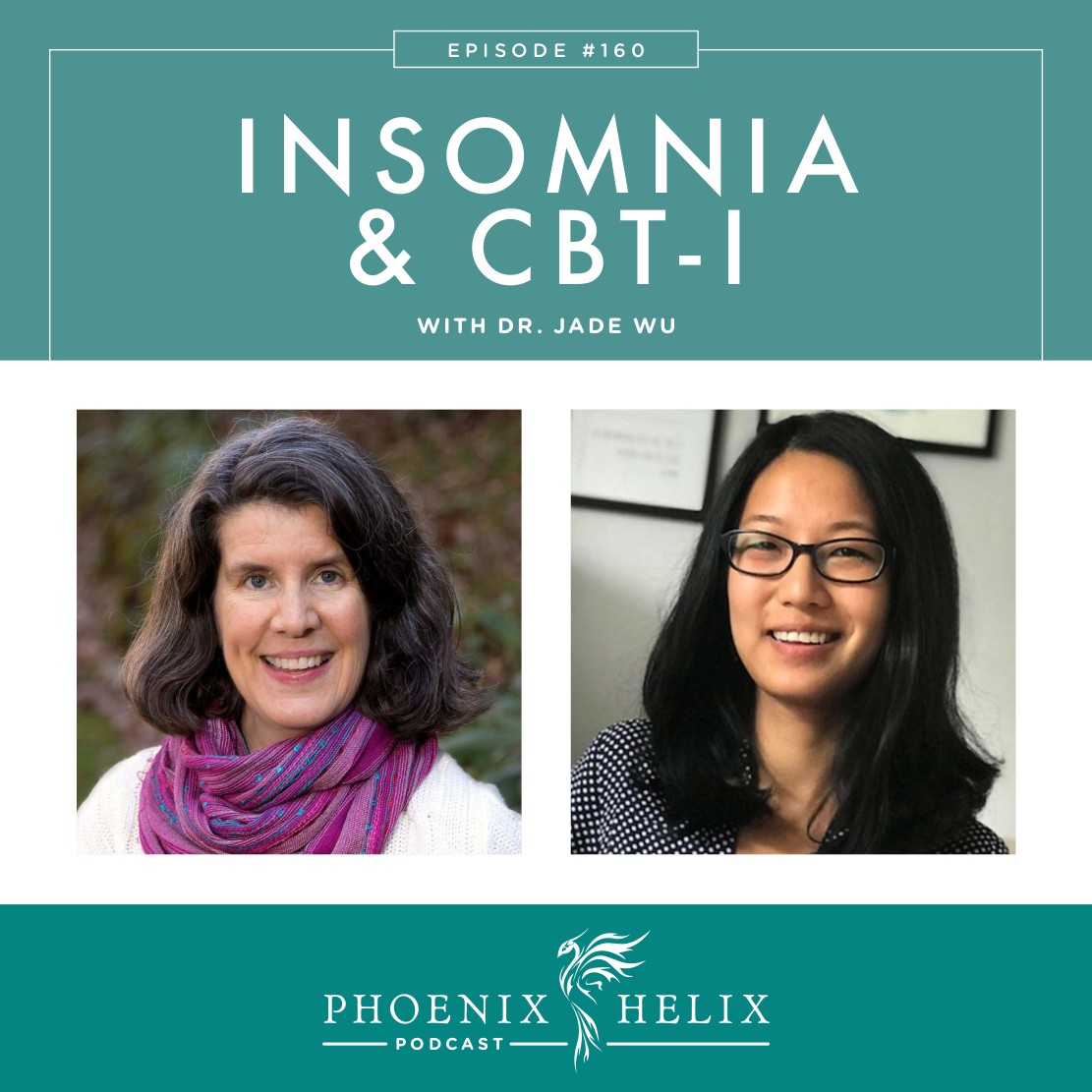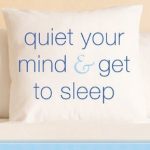
What Is CBT-I?
Cognitive Behavioral Therapy for Insomnia is more effective than sleeping pills, and doesn’t come with side effects. How compelling is that? We talk a lot about the importance of sleep on this podcast. Lack of sleep can lead to autoimmune flares, which in turn can interfere with sleep, creating a vicious cycle. This happens to everyone once in a while, and there are some basic interventions we can do to support our ability to sleep well. But what if you’ve tried all the basics, and nothing seems to work? That’s called chronic insomnia, and that’s the focus of our podcast today. CBT-I is specifically designed to help you overcome chronic insomnia. My guest is Dr. Jade Wu, a clinical psychologist and behavioral sleep medicine researcher. The focus of her research is treating sleep disorders in people with chronic illness.
Listen to the Show
- Subscribe to my podcast through your favorite podcast app: iTunes, Stitcher, Google, TuneIn, Spotify, Amazon, etc.
- You can also listen to the episode right here through the player below, and if you subscribe to my newsletter you’ll get notified of future episodes.
Podcast: Play in new window | Download
Show Notes
- Intro (0:00)
- Thank You to Our Podcast Sponsor: Paleo on the Go (1:49)
- A frozen meal delivery service, 100% of their menu is compliant with the elimination phase of the paleo autoimmune protocol (AIP). They have over 5o items, including entrees, side dishes, broth, AIP-friendly bacon, and desserts.
- Use the code PHOENIX for 10% off your first order.
- Meet Dr. Jade Wu (2:58)
- Dr. Jade Wu is a clinical psychologist and behavioral sleep medicine researcher.
- Her father was a sleep researcher as well, optimizing sleep for Chinese astronauts in space.
- Jade began her career in psychology, but she quickly saw that people with mental health issues almost universally struggled with sleep. The same was true for people with chronic illness. She realized that if she could improve sleep for her patients, their other health symptoms often improved simultaneously. It was a powerful intervention, so she shifted her research to focus on sleep and chronic illness.
- When we’re caught in a vicious cycle of insomnia and autoimmune flares, it’s a powerless feeling. An empowering reframe is realizing that this gives us two places to intervene. One is reducing inflammation and calming the autoimmune activity which often improves sleep. But the other is to improve sleep and get the benefits of lower inflammation and autoimmune activity. The cycle works both ways.
- Defining Insomnia (5:23)
- Insomnia is frequently having trouble falling or staying asleep (more nights than not). It’s not the occasional bad night’s sleep – everyone has those.
- Short-term insomnia (also called acute sleep disruption) is usually caused by something else: new parenthood, lost job, health issues, or another big stressor or change in your life. It may last a few months, but when the situation stabilizes, sleep is restored.
- Chronic insomnia (also called Insomnia Disorder) is when insomnia lasts for three months or longer. At this point, the original trigger for the insomnia might be resolved, but your body is stuck in a pattern of poor sleep.
- CBT-I is designed to overcome chronic insomnia.
- Basic Sleep Troubleshooting (7:04)
- There are basic interventions we can do to improve our sleep and overcome short-term disruptions. Try those first. CBT-I is an advanced technique that’s very effective for overcoming chronic insomnia, and especially helpful to people who have tried everything else and are still struggling with sleep.
- Resources for First Interventions to Improve Sleep:
- How Short-Term Insomnia Becomes Chronic (8:21)
- Predisposing Factors – inborn traits which might make you more prone to sleep disruption (i.e. sensitivity to light or sound, or a tendency toward anxiety.)
- Precipitating Factors – this is the triggering event, which varies between people. In our community, it’s often the symptoms and stress of autoimmune disease. These can cause short-term insomnia, but they don’t always lead to chronic insomnia. Sleep is so important to the body that it has a powerful ability to adapt, restoring sleep even in the presence of ongoing symptoms.
- Perpetuating Factors – thoughts and ways of thinking about sleep that keep insomnia going. Often, these are actions we take to “make up” for poor sleep (like napping, sleeping in, spending more time in bed, etc.) It’s also the stress and effort we start putting into our sleep, that paradoxically keeps us awake. This is where CBT-I intervenes.
- Resource Article: Insomnia 101.
- What Is CBT-I? (12:49)
- CBT-I is Cognitive Behavioral Therapy for Insomnia. It’s rooted in the belief that human beings are wired for sleep. The therapy focuses on removing the obstacles to sleep that are causing the insomnia, and restoring your body’s natural sleep ability.
- It’s a short-term protocol, usually 4-8 sessions. It’s not talk therapy – it’s behavioral therapy. You learn skills that you then implement at home, and it’s personalized to you.
- It usually contains 6 components:
- Assessment & Functional Analysis: Identifying your unique sleep obstacles, sleep habits, and beliefs around sleep.
- Stimulus Control: Re-teaching the brain that the bed is a happy, relaxed, sleepy place. For people with chronic insomnia, their bed is often associated with stress, discomfort, anxiety, and the inability to sleep. To break this connection, get out of bed if you can’t sleep, and spend your awake hours somewhere else, even in the middle of the night. Only stay in bed if you’re sleeping.
- Sleep Restriction: Jade likes to call this Sleep Efficiency Training. You consolidate your sleep into a shorter sleep window. It breaks the cycle of wakefulness, because you only give your body a short period of time in bed, and the body learns to respond by sleeping deeply. It can take a few days or weeks for your brain to make this shift, but when it does, your quality of sleep improves dramatically. The level of sleep restriction is personalized to each person.
- Cognitive Therapy: Education about sleep myths vs. truths, and exploring and transforming unhelpful thoughts and fears about sleep.
- Relaxation Training: This is an optional step and may include training in mindfulness meditation, progressive muscle relaxation, deep breathing, and others.
- Sleep Hygiene: Jade saves this step for last, because most people with chronic insomnia have tried all the normal tips for healthy sleep hygiene, and it wasn’t enough to cure their insomnia. She only addresses this area is there is a big sleep hygiene problem interfering with a patient’s sleep.
- The Pros & Cons of Sleep Hygiene (29:31)
- These are the things we do to support a good night’s sleep. For people who don’t suffer from chronic insomnia, they can be very helpful.
- However, once chronic insomnia sets in, sleep hygiene isn’t effective in overcoming it. CBT-I is the research-proven treatment for insomnia. Jade gives the example of dental hygiene. You floss in the hopes it will help prevent cavities, but if you get a cavity, flossing won’t cure it.
- Is sleep hygiene ever harmful? Yes – if it becomes too effortful, and you feel stressed about doing it perfectly. Then it is more likely to interfere with sleep by causing performance anxiety.
- Thank You To Our Podcast Sponsor – Luminance Skincare (33:45)
- Winter is coming and if you’re anything like me, dry skin follows. Luminance has some wonderful products. For the face, they have a Deep Hydration Moisturizer for daytime, and a Nite Skin Butter to moisturize while you sleep. Both of these are unscented, which I love. For hands, they have a luscious but absorbent Hand Cream, and you can get that unscented or infused with lavender essential oil – your choice.
- Whereas conventional skincare products are full of chemicals that can hurt our bodies, Luminance is made from ingredients that nourish. Their products are natural, organic, wildcrafted, non-GMO, and gluten-free (and they’re even made in a dedicated gluten-free facility).
- They have a complete face and body care line, including cleansers, toners, moisturizers, masks, acne serum, hand sanitizer, sunscreen, haircare, and more.
- Place an order here, and use the code HELIX for 10% off your first order.
- Chronic Illness: the Difference Between Tired & Sleepy (35:01)
- When you have chronic illness, it’s common to spend a lot of time in bed, trying to rest, catch up on sleep, and support your body’s healing. The problem is that this can become a perpetuating factor for chronic insomnia. When you spend time in bed when you’re not actually sleepy, your brain starts to associate your bed with wakefulness.
- There’s a difference between feeling tired and feeling sleepy. A goal of CBT-I is to help people differentiate between the two. Physical cues of sleepiness include droopy eyelids, reading the same sentence over and over, feeling yourself close to nodding off. That’s a good time to go to bed. Tiredness and fatigue are very different, and sleep isn’t always the solution. You may be physically and mentally depleted, but not sleepy. Better choices in those moments are things that help you rest and rejuvenate, and it’s important to do those things somewhere other than bed. It might be curling up in a chair with a cup of tea and a good book. It might be having a conversation with a supportive friend, going for gentle walk, watching a relaxing movie. There are lots of options, and sleep therapists help people discover their personal favorites.
- One of the main benefits of CBT-I is improving fatigue by overcoming insomnia, but that often means spending less time in bed rather than more.
- Sleep therapists also help people identify root causes of fatigue beyond insomnia (i.e. stress, depression, autoimmune symptoms, rainy weather, dehydration, screen fatigue, boredom, inactivity, or overactivity, etc.)
- What’s the Definition of Success? (41:37)
- Answering yes to the following questions: Has CBT-I improved your relationship with sleep? Are you less stressed about sleep? Has your sleep quality improved? Do you feel more rested after sleeping? Do you feel better physically and mentally during your waking hours?
- Quality of sleep is more important than quantity of hours, and this is what improves first during the active treatment phase of CBT-I. Sleep quantity tends to improve over time, once the body becomes accustomed to sleeping.
- CBT-I vs. Sleep Medications (46:52)
- Sleep medications do have their place. The problem is they often come with side effects and also become less effective over time.
- CBT-I is side-effect free, and research shows it is more effective than sleeping pills long-term. This is because CBT-I addresses the root causes of insomnia, rather than simply sedating the symptoms.
- Jade has experience helping people get off sleep medication. It’s important to do this carefully with the guidance of a practitioner. Jade recommends continuing your medication when you first begin CBT-I, and then slowly taper your dose as CBT-I begins to take effect. This minimizes rebound insomnia and psychological withdrawal.
- Finding a Qualified Sleep Therapist (52:43)
- Ideally, your practitioner will be a behavioral sleep medicine psychologist. But this is a rare specialty, and it is possible to be an excellent sleep therapist without this qualification. When researching therapists, ask: (1) What is their CBT-I training? (2) How much experience do they have helping patients overcome insomnia? Is it a big or small part of their practice?
- Practitioner Directories:
- CBT-I Books and Apps (54:48)
- Book: Quiet Your Mind and Get to Sleep.
- Apps: Sleepio and Somryst.
- Risks and Cautions with CBT-I (56:30)
- For certain health conditions, it’s best to work with a sleep therapist rather than try self-taught CBT-I. Professionals can modify the program to minimize any risks.
- For people with bipolar disorder, there’s risk that the sleep restriction phase could trigger mania.
- Similarly, for people with epilepsy, there’s risk that sleep restriction could trigger a seizure.
- For people with PTSD or a history of trauma, CBT-I often improves symptoms in the long-term but may intensify them in the short-term. Working with a professional allows for modification and support.
- If you are at risk for falls, the sleep restriction phase needs to be carefully monitored.
- The Role of Self-Compassion (58:14)
- When it comes to sleep therapy, Jade values science and compassion equally. There is enough meanness in the world already. We don’t need to make life more difficult by being mean to ourselves.
- Our bodies and our sleep are our friends, not tools to be used, or bent to our will. This is especially true when our health isn’t perfect.
- Sleep is a wonderful place to start practicing self-compassion, by tuning into what our bodies need, instead of trying to force our bodies to perform to a rigid set of expectations or rules.
- Resources:
- Outro (1:00:31)
- You can connect with Dr. Jade Wu through her website. There you’ll find resources on CBT-I and her latest research. Jade is also the host of the Savvy Psychologist Podcast.
- Eileen (your podcast host) is the author of multiple books, written to help people thrive with autoimmune disease. Learn more on the Books Page.
- If you like this podcast, follow or subscribe through your favorite podcast app. You can also subscribe to Eileen’s biweekly newsletter.
- Check out the entire archive of podcast episodes.
You May Also Be Interested In
Spreading the Word
If you like the podcast, please leave a positive review in iTunes. It would mean the world to me, and also helps others find the podcast. Here are some quick instructions using your iPhone:
- If you are already subscribed to my podcast: (1) Click the purple podcast icon. (2) At the bottom of the screen, click Library. (3) At the top of the screen, click Shows. (4) Click the Phoenix Helix podcast image. (5) Scroll down the page, and you’ll see Ratings and Reviews. Scroll down a little bit more and click on Write a Review. This will bring up the review screen. Tap 5 stars (if you love the podcast), and then click in the title box, and it will bring up the keyboard. Enter a title and short review. (6) Click Send in the upper right corner. (7) Thank you! Positive reviews give the podcast a higher search ranking in iTunes, helping people find it and letting them know it’s a quality podcast and worth their time to listen.
- If you haven’t subscribed to my podcast: (1) Click the purple podcast icon. (2) In the lower right corner, click the magnifying class. (3) Type Phoenix Helix in the search box. (4) Click the podcast cover in the Show list. (5) If you’d like to subscribe, click the + sign at the top of the screen. (6) To write a review, scroll down the page, and you’ll see Ratings and Reviews. Scroll down a little bit more and click on Write a Review. This will bring up the review screen. Tap 5 stars (if you love the podcast), and then click in the title box, and it will bring up the keyboard. Enter a title and short review. (7) Click Send in the upper right corner. (8) Thank you! Positive reviews give the podcast a higher search ranking in iTunes, helping people find it and letting them know it’s a quality podcast and worth their time to listen.








I have a pattern of sleep known as biphasic where I wake up 3-4 hours after falling asleep. Then it will take me another 2 hours to fall back asleep where I then sleep another 2-3 hours but a lighter sleep. I am spending much more time in bed like the guest said to get a minimum amount of sleep, but how do I restrict the time in the middle of the night? She didn’t really seem to go into detail about how to actually restrict the time in bed. What I have been doing is getting up and reading a book for an hour or 2 and then going back to bed. It’s super frustrating and I’m groggy during the day. She also didn’t seem to say anything about hormones that causes waking in the night such as a rise in cortisol.
Hi Na Nee. With sleep restriction, you either go to bed later, get up earlier (or both). The idea is that your body will sleep more deeply during a shorter time in bed and overcome the pattern of insomnia you are currently experiencing. There are lots of links in the show notes for further resources, including links to practitioner directories as well as apps you can try. But a good place to start is this book which will go into more detail about CBT-I techniques: https://amzn.to/2Hx7Y2W